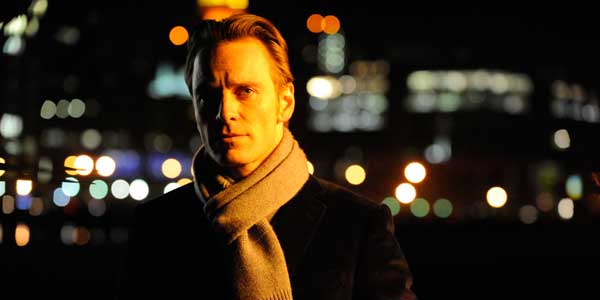
Director: Steve McQueen
Running Time: 100 mins
Certificate: 18
Release Date: January 13th, 2012

Oh my God, Michael Fassbender has a penis! Whoever would have thought it? The fact the actor’s little man makes a more than fleeting appearance in the Shame has received so much attention, you’d have thought everyone has assumed he was a Ken-doll down there before he proved otherwise. It’s a pattern that’s repeated over and over, as if an actress gets naked it’s either barely mentioned or letched over, while male actors gets epithets like ‘brave’ and ‘bold’ thrown around. That’s not Fassbender’s fault, as he’s just doing his job and doing it well (and I’m sure there are some who’ll more than welcome little Fassbender’s appearance in the movie), but it would be nice if we could treat male and female genitals equally!
The actor and his penis play Brandon, a man who’s constantly on the prowl for sex – picking up women in the subway, ordering escorts at his porn-crammed apartment, and slipping off to hotels with willing co-workers. While in many films that would be a recipe for a rollicking sex comedy, Brandon’s world is a relentlessly bleak one, where sex is an absolute compulsion rather than something fun. He is endlessly drawn to the distraction and few moments of release, without ever being able to experience the joy of it – indeed you get the feeling he actively doesn’t want to feel joy.
As a result he lives a life full of endless meaningless connections, as if he’s desperately trying to find something his own actions ensure he’ll never get (and by the nature of addiction he’ll never realise that). The title – Shame – is less about about Brandon’s journey and more about the condition he constantly lives in. And thanks to Michael Fassbender’s intense, rather desolate and angry performance (his orgasm face is almost fury), it feels incredibly real.
However while we follow Brandon through his rather cold, out-of-time version of New York, we never really get to know much about him. The result is both a strength and weakness. It means the film acts rather like a mirror, holding itself up to the audience’s experience of life. Each person who watches it will bring their own worldview to Brandon, purely because most of what we know of him is the desperation he’s trying to find his way through. It’s the reason why the movie has had responses from absolute adoration to utter contempt.
Those who truly hate it seem to do so from a place of misunderstanding addiction or being unable to see sex as a true addiction. Shame does little to dissect the nature of addiction, or to explain how or why someone can become an addict, especially to something like sex, which unlike heroin, isn’t a chemical you can get hooked on. It means that your reaction to Brandon and the movie is entirely reliant on where you’re coming from – so you may end up seeing the character as rather tedious, self-centred ass or someone who’s an incredibly tragic hero, with the truth probably being somewhere inbetween.
If you’re willing to engage with it, Shame is a fascinating, disturbing film, but you would expect no less from director Steve McQueen. His last film – the even bleaker Hunger, about the Bobby Sands hunger strike – was so spare that it let two characters sit at a table and talk for a single, stunningly long 17-minute take, drawing you in with ideas rather than spectacle.
Shame is undoubtedly stylish, although this becomes a slight issue as while Brandon’s character feels very real and grounded, he doesn’t feel like he quite lives in the real world. While the claustrophobic, bleak, past-meets-present New York is perhaps too idiosyncratic, the shot composition is wonderful, with McQueen framing everything in a way that forces you to look hard at what you’re being shown. Indeed purely from the editing, watching the film becomes a somewhat uncomfortable experience (as it should be).
Although Shame is mainly about Fassbender’s Brandon and the succession of partners he shags and moves on from, the film get a jolt of energy from Carey Mulligan as his damaged sister. If Brandon seems determined to feel nothing beyond a few seconds of release, his sister, Sissy, feels too much. In one striking scene he watches a porn video full of faked passion while trying to ignore his sister’s true, broken-hearted emotions spilling out next door.
The true depth of the movie comes from the interplay between the two characters. Something has gone very wrong in their past and as a result they’re both damaged people. Most films would be obsessed with finding as easy excuse for their behaviour by over-explaining the past, but in Shame that’s left hanging, perhaps because for both of them, it’s not really about how they got to that point, but the life they’re trapped in now.
One problem I did have with the film’s ‘leave it to the audience to decipher’ attitude, where nothing is fully explained, is Brandon ending up having gay sex in a sauna. It’s difficult to know how to take it. It does appear that when we him going to a sauna, it isn’t the first time he’s found release with a man and it does underline how it’s his desperation for sex and not who it’s with that drives him. However it’s placement towards the end of the movie makes it difficult not to feel we’re supposed to see this as some sort of ‘descent’ to a new level of depravity.
On one level that’s fair enough, as it does underline how his sexual compulsion has detached itself from any form of human longing, and connection. After all, if it were the other way round – a gay man who started shagging women purely for sexual release even though he wasn’t at all attracted to them – the point would be the same. However with the film boldly (and admirably) refusing to give pat answers to things, it means the some audience members will inevitably come up with their own dumb reasons for everything. In terms of Brandon having gay sex and where it comes in the movie, many will reach the conclusion he’s sunk to a new, near-rock-bottom low because he’s doing it with a dude, rather than what it means to have a totally straight character who compelled to have sex so much that sexual orientation becomes less important than getting that orgasm.
The only other option would be for McQueen and screenwriter Abi Morgan to come in and heavy-handedly give reasons for what Brandon’s doing at this point, which would undermine one of the film’s great strength, that it trusts the audience to be intelligent and not to assume everything can be shoved into easy boxes. The downside is that there are a lot of idiots out there who will watch Shame and either be angry that it doesn’t do all the work for them, or dislike it because they assume it’s saying something which is actually just them projecting themselves onto the film. Shame is thought-provoking cinema, and while it has its weaknesses, it certainly engages your brain, as long as you’re willing to let it do that.
Overall Verdict: Graphic, stark and rather desolate, Shame is a fascinating film as long as you’re prepared to engage your brain and allow Michael Fassbender’s wonderful performance to draw you into a dark world.
Reviewer: Jake Davis





Leave a Reply (if comment does not appear immediately, it may have been held for moderation)